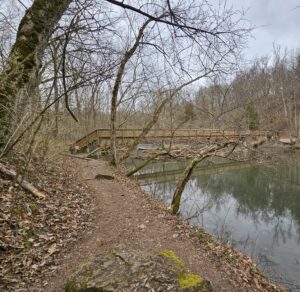
I grew up only ten miles from John Bryan State Park. My family hiked its trails together when I was young. As a Campfire girl, I attended day camps there, and even trembled through one scary overnighter in the primitive camping area. In later years, I frequented the park to hike and picnic with my classmates. So many pleasant memories.
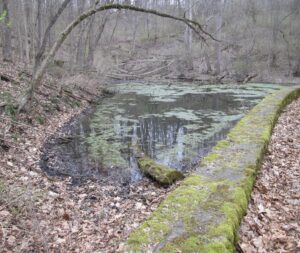
One odd recollection, though, mingles among the others. I remember a small pond right beside a road within the park. A low stone wall held the water in next to the road. On its other sides, the surrounding terrain rose to contain the water in its depression. Walking along the road in the summer, I could smell the pond several yards before I reached the scum-covered water. Because of its powerful odor, that childhood pond has the distinction of teaching me the meaning of stagnant.
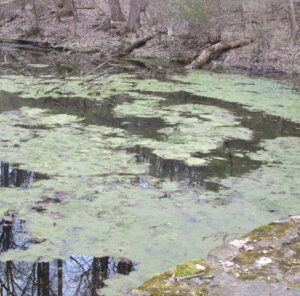
Here’s a simplified explanation of what caused this condition: The pond had no water flowing in or out of it, so the oxygen level decreased in the standing water. Without sufficient oxygen, the water couldn’t support life, so the beneficial bacteria that consume nutrients died. The resulting excess of nutrients became muck on the pond floor, increasing organic matter. That continued a cycle of creating more nutrients that didn’t get consumed and causing the buildup of more layers of muck until the pond was dead—and smelly.
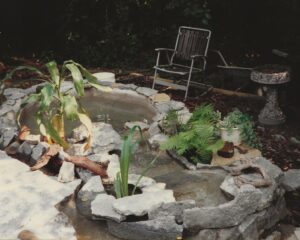
Many years ago, CW built a pond in our backyard. He ran some tubing under the patio so he could pump water from the pond to a small fountain a few feet up in the yard. The water then traveled back underground, emerged into a stone trough, and trickled down stone steps into the pond. His system of water in and water out provided a healthy oxygen level in the pond so we could enjoy beautiful koi and healthy water plants—until the ruinous night the raccoons feasted on fish and water lettuce. (You can read the sad story in a previous post.)
Like the pond with no streaming water, our Christian life can become stagnant. If we don’t have the living water of Christ regularly flowing into and out of us, we will become spiritually lifeless—not growing ourselves and not contributing to the life of God’s Kingdom.

Living water can flow in through Bible study, teachings, prayer, meditation on God’s Word, worship of God in music—any way in which we interact with God to know him better and to give him an opportunity to speak his truth into our life. This is how we grow spiritually.
Living water in, though, is only half of the requirement for our spiritual life to thrive. If our learning is not passed on, or consumed, it can build up in us like layers of muck on the pond floor. Instead of allowing it to change us to be more like Christ, we may become boastful about what we know. Our increasing body of facts and knowledge may cause us to be critical and judgmental toward others who haven’t “learned” what we have. Before long, we might notice people taking a detour around us…and they might even be holding their noses.

If we allow the living water to change us, though, we will become more sensitive to the needs of others and more compassionate. Then the water will continue to flow through us into the lives of others in positive ways. We may lend a helping hand or a listening ear. We may befriend one who is lonely. We may teach others what we have learned. We may volunteer with worthwhile organizations. Any way we can share Jesus with others keeps the living water flowing through us.
Jesus says to individuals “come to me and drink” and “streams of living water will flow from within” you to a thirsty world (John 7:37-38). Living water in and living water out. We will be like a crystal clear pond teeming with life—accomplishing the good works we were created in Christ Jesus to do (Ephesians 2:10).
I think it is the same for the church. For a body of believers to be alive, it needs to drink in living water to mature in its spiritual life and that water needs to flow out to the world.

Luke writes of the early believers after Jesus’ resurrection and return to heaven: “They devoted themselves to the apostles’ teaching and to the fellowship, to the breaking of bread and to prayer” (Acts 2:42). By participating daily in these activities—receiving instruction in God’s Word, sharing meals with each other in their homes, praying with and for one another, and caring for and encouraging each other—the believers grew in the ways of the Lord.

(from ToTheEndsOfTheEarthMovie.com)
Spiritual growth was Paul’s goal for the church. He said, “We proclaim [Jesus], admonishing and teaching everyone with all wisdom, so that we may present everyone perfect in Christ” (Colossians 1:28). Perfect here means “having reached its end, complete…specially of the completeness of Christian character” (Strong’s Concordance). Maturity is a process. A definite purpose of the church is to have a constant inflow of the living water so “the body of Christ may be built up” (Ephesians 4:12) and “will in all things grow up into him who is the Head, that is, Christ” (Ephesians 4:15).
As a church body matures in the ways of the Lord, the living water should naturally flow out of it. The last words Jesus spoke to his eleven disciples before he ascended to heaven were, “19Go and make disciples of all nations, baptizing them in the name of the Father and of the Son and of the Holy Spirit, 20and teaching them to obey everything I have commanded you” (Matthew 28:19-20).
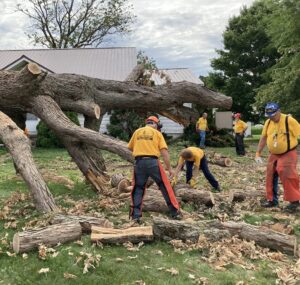
Jesus commanded his disciples to go. They weren’t to just sit around reliving the wonderful experiences they’d had with their teacher. Jesus had come to earth to give his life so all people could be reconciled to God. Therefore, the church is called to go outside the walls of the building to share Jesus with those who don’t yet know him. It is important for the individuals in a local church body to serve God together in unity, for that is how the world will see and understand God’s love for them (John 17:23). That’s living water flowing out.
Whether we’re considering an individual or a church body, focusing only internally or only externally will cause stagnation. But when living water continuously flows through us, our life will flourish. We will always be growing and have much to offer a thirsty world.
Scripture quotations are from NIV.
Greek definition is from Bible Hub. See Resources.

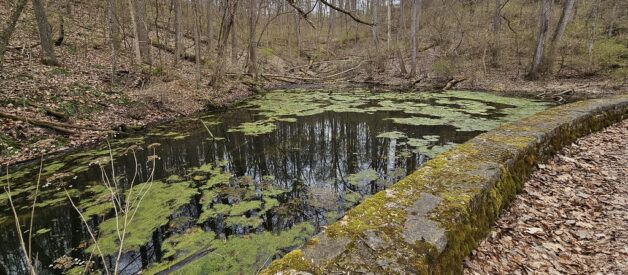


Brenda+Murphy
April 4, 2024A good reminder that living water needs to flow both ways. I also found that the closer I got to God the bolder and more confident I became in who I was, and the more excited I was to share. Not because I “needed” to but because I was so excited about him I couldn’t keep my mouth shut, lol.
Bonnie
April 4, 2024Yes, that is so true, and a really good point! That makes me think of what Jesus said. “I came that they may have life, and have it in abundance [to the full, till it overflows].” (John 10:10, Amplified version) There’s so much of it, it has to flow over onto others!
Thanks, Brenda.
marilyn
April 6, 2024Oh, how I love to drink that living water!
Marilyn
Bonnie
April 6, 2024Nothing else can satisfy our soul like it does! Thank you, Marilyn.